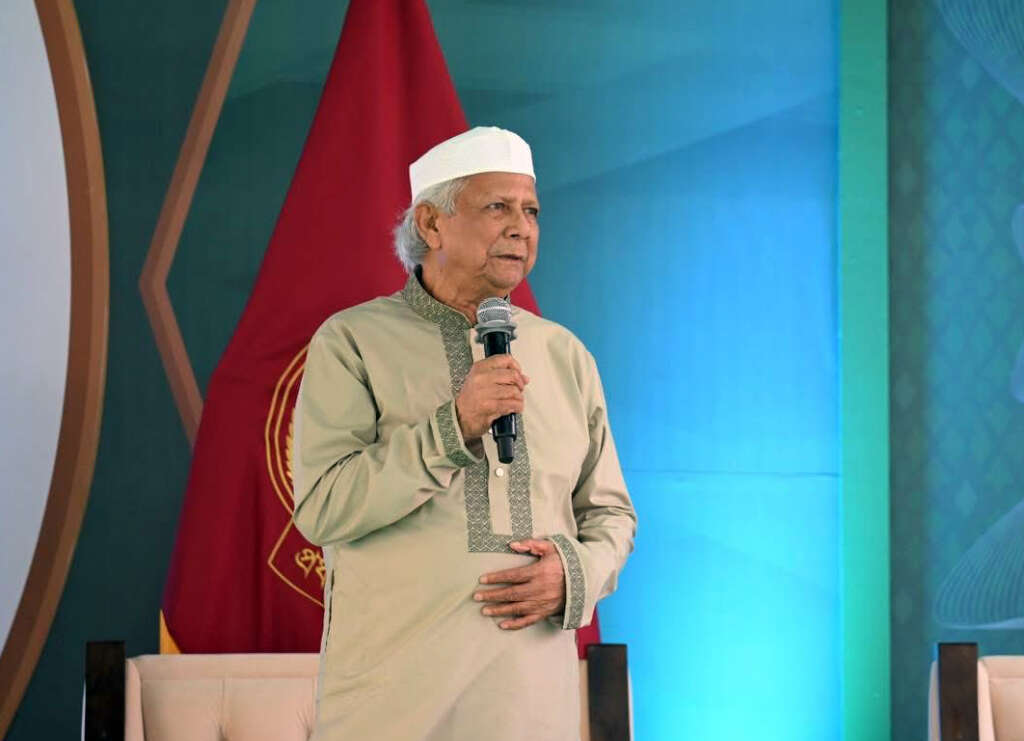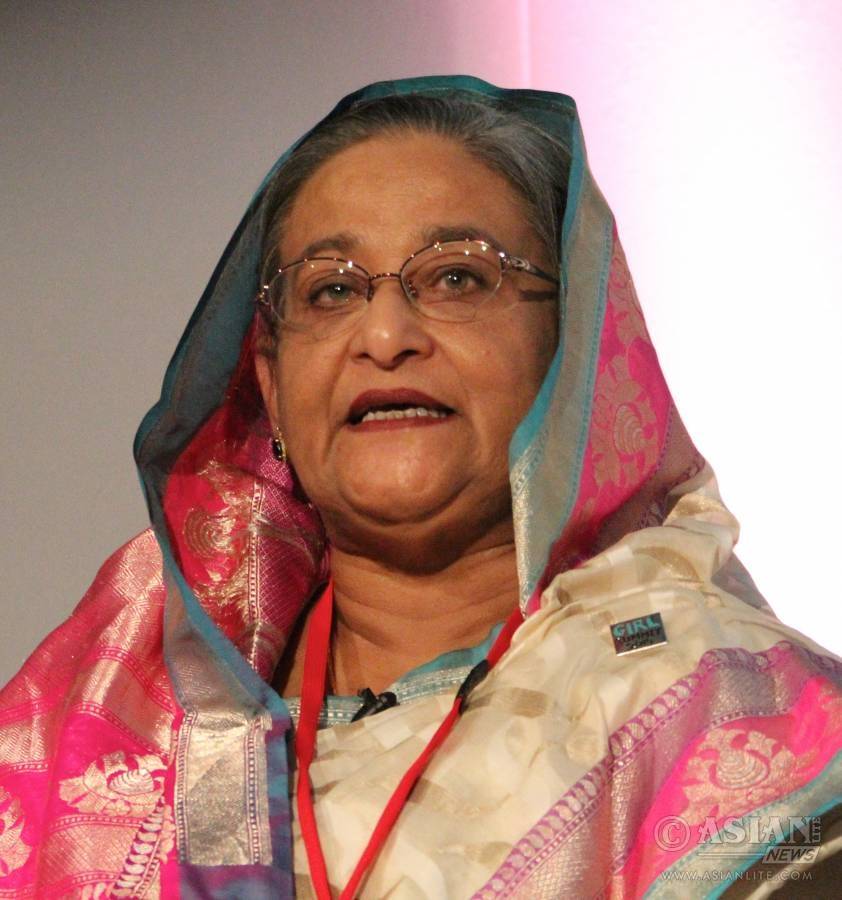More than 2,000 members of the Bangladeshi diaspora gathered at Trafalgar Square to voice their outrage against what they described as the systematic repression and human rights abuses carried out under the unelected interim government in Bangladesh, led by Muhammad Yunus … writes Mohammed Saif
On September 15, the heart of London became the stage for a display of frustration, grief, and defiance.
More than 2,000 members of the Bangladeshi diaspora gathered at Trafalgar Square to voice their outrage against what they described as the systematic repression and human rights abuses carried out under the unelected interim government in Bangladesh, led by Muhammad Yunus.
Their chants, placards, and unified march toward Downing Street underscored a message that has grown louder in recent months: Bangladesh’s democratic fabric is being torn apart, and the international community cannot feign ignorance.
The demonstration, organised by diaspora groups across the United Kingdom, highlighted a deep sense of alienation among Bangladeshis living abroad who watch their homeland descend into authoritarianism.
Protesters carried banners denouncing the “Yunus regime” and demanding an end to the attacks on Bangladesh’s democratic institutions, the suppression of dissent, and the targeting of minorities.
At Downing Street, they handed over a letter addressed to the British Prime Minister, warning that the erosion of the rule of law in Bangladesh threatens not only the nation’s citizens but also the global credibility of democratic norms.

The grievances articulated in that letter were damning.
The protesters expressed alarm at the collapse of Bangladesh’s pluralistic political culture, pointing to the unprecedented decision by the interim administration to ban the Awami League, one of the country’s largest political parties, from contesting elections.
This move alone disenfranchises tens of millions of citizens, stripping them of political representation and silencing their voices in the electoral process.
For the diaspora in London, the disenfranchisement of their families back home was not an abstract violation—it was a direct attack on the principle of democracy itself.
The picture painted by rights groups is no less grim. Human Rights Watch has documented a wave of politically motivated charges in the wake of the interim government’s rise to power.
In its first 100 days, more than 1,000 police cases were filed against tens of thousands of individuals, many of them supporters of the Awami League, without legal basis.
Arbitrary detentions have since intensified. In a chilling display of collective punishment, the police filed cases against over 8,400 unnamed people in connection with ten murder cases.
Such tactics reveal a pattern not of justice, but of persecution, where entire communities are criminalised for their political allegiances.
The clampdown has not been confined to political opponents. The media and judiciary have also been drawn into the crosshairs.
More than 160 journalists deemed sympathetic to the former government have had their accreditation revoked, effectively stripping them of the ability to work. Others face trumped-up charges, including false accusations of murder.
Detained journalists are denied proper legal representation, further exposing the fragile state of Bangladesh’s judicial independence.
The diaspora protesters in London were vocal about this assault on the press, equating it with a deliberate effort to silence truth and erase dissenting narratives from public discourse.
At the core of the demonstration lay not just political grievances, but a cry of anguish over the targeted violence directed at religious minorities.
Since Yunus seized power, reports of attacks against Hindus and other religious groups have multiplied at an alarming rate.
In the first three months of his rule alone, over 2,000 incidents of violence against minorities were reported.
Homes have been burned, temples desecrated, and entire communities terrorised. For many in the London crowd—some of whom had family directly affected by this violence—these attacks embodied the darkest face of the current regime: one that weaponises intolerance and fear to consolidate power.
Trafalgar Square has long been a space where marginalised voices find amplification, and on this September afternoon, it resounded with the anguish of a community tethered to its homeland by both memory and blood.

The march to Downing Street was not simply symbolic. The diaspora demanded that the British government acknowledge its moral and historical ties to Bangladesh and confront the unfolding crisis with urgency.
Their letter was clear in tone: “The UK Government cannot stand by while its close ally descends into lawlessness. The history of our two countries is intertwined.”
The protest reflected a broader sense of betrayal felt by many Bangladeshis worldwide.
Yunus, once celebrated internationally as a Nobel laureate, now presides over a regime marked by repression and violence. His government’s image abroad has darkened rapidly, as global rights groups and advocacy organisations document the unfolding abuses.
Yet, for the protesters in London, symbolic condemnation is insufficient. They believe that their homeland has been abandoned to the whims of an unelected elite determined to erase opposition, extinguish pluralism, and govern through fear.
Their message was also deeply personal. Many speakers at the rally described family members and friends back in Bangladesh who had been harassed, detained, or forced into hiding because of their political loyalties.
Others shared accounts of minority communities living under constant threat, their places of worship desecrated and their rights stripped away.
Placards carried by demonstrators bore slogans such as “Democracy for Bangladesh” and “Stop Persecuting Minorities,” capturing the twin threads of political repression and communal violence that define life under the Yunus regime.
The intensity of the protest in London mirrored the gravity of the crisis in Bangladesh. By banning a major political party from elections, the interim government has struck at the foundation of representative governance.
By flooding courts with politically motivated cases, it has perverted the machinery of justice. By targeting journalists and the judiciary, it has silenced the very institutions tasked with holding power accountable. And by unleashing violence on minorities, it has shattered the social contract that binds diverse communities together.
The march from Trafalgar Square to Downing Street was a vivid display of how far-reaching the crisis has become.
It is not only Bangladeshis at home who are suffering; the diaspora feels the impact in their bones, carrying the anguish of displacement, of powerlessness, and of a homeland slipping further into authoritarianism.
Their voices, raised in the heart of London, testified to a truth that governments often seek to ignore: repression does not stay contained within borders. It reverberates across continents, carried by those who will not allow silence to erase suffering.













